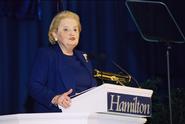
Former Secretary of State Madeleine Albright, the highest ranking woman in the history of U.S. government, met with about 50 Hamilton students prior to her public lecture March 6 and gave her views on U.S. foreign policy and hot spots around the world.
In responding to students' questions, Albright confessed that she had many great days as secretary of state, but her worst days came following the bombings of U.S. embassies in Kenya and Tanzania. She talked with pride of helping to manage "the devolution of our major adversary" by working with the Russians to become a smaller country, and voiced her support for "a change in regime in Iraq." In response to a question about the embargo against Cuba, she said that in 1993 the Clinton Administration thought about normalizing relations with Cuba, but that "until Castro dies there won't be a change."
Albright also touched on other U.S. foreign policy concerns, including Afghanistan, India and Pakistan, North Korea and the Israeli-Palestinian conflict. She said President Bush's labeling of Iran, Iraq and North Korea as an "axis of evil" was a mistake, because "they don't fit together," and "we have to deal with each one individually." According to the former secretary of state and former U.N. ambassador, "the set of sanctions set up by the United Nations [against Iraq] were justified, but many people are under the mistaken impression that the sanctions include an embargo against importing food and medicine."
Albright was visiting Hamilton as part of the Sacerdote Great Names Series, a program that most recently hosted former President Jimmy Carter. Approximately 3,750 people attended her free public lecture in the Margaret Scott Bundy Field House.
Posted March 6, 2002
